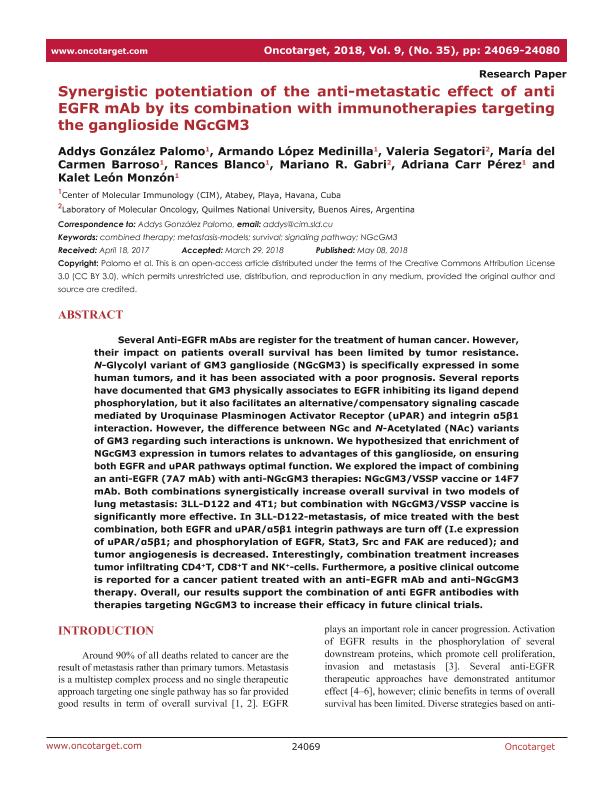Mostrar el registro sencillo del ítem
dc.contributor.author
González Palomo, Addys
dc.contributor.author
López Medinilla, Armando
dc.contributor.author
Segatori, Valeria Inés

dc.contributor.author
Barroso, María del Carmen
dc.contributor.author
Blanco, Rances
dc.contributor.author
Gabri, Mariano Rolando

dc.contributor.author
Pérez, Adriana Carr
dc.contributor.author
Monzón, Kalet León
dc.date.available
2022-11-04T18:02:21Z
dc.date.issued
2018-05
dc.identifier.citation
González Palomo, Addys; López Medinilla, Armando; Segatori, Valeria Inés; Barroso, María del Carmen; Blanco, Rances; et al.; Synergistic potentiation of the anti-metastatic effect of anti EGFR mAb by its combination with immunotherapies targeting the ganglioside NGcGM3; Impact Journals; Oncotarget; 9; 35; 5-2018; 24069-24080
dc.identifier.issn
1949-2553
dc.identifier.uri
http://hdl.handle.net/11336/176506
dc.description.abstract
Several Anti-EGFR mAbs are register for the treatment of human cancer. However, their impact on patients overall survival has been limited by tumor resistance. N-Glycolyl variant of GM3 ganglioside (NGcGM3) is specifically expressed in some human tumors, and it has been associated with a poor prognosis. Several reports have documented that GM3 physically associates to EGFR inhibiting its ligand depend phosphorylation, but it also facilitates an alternative/compensatory signaling cascade mediated by Uroquinase Plasminogen Activator Receptor (uPAR) and integrin α5β1 interaction. However, the difference between NGc and N-Acetylated (NAc) variants of GM3 regarding such interactions is unknown. We hypothesized that enrichment of NGcGM3 expression in tumors relates to advantages of this ganglioside, on ensuring both EGFR and uPAR pathways optimal function. We explored the impact of combining an anti-EGFR (7A7 mAb) with anti-NGcGM3 therapies: NGcGM3/VSSP vaccine or 14F7 mAb. Both combinations synergistically increase overall survival in two models of lung metastasis: 3LL-D122 and 4T1; but combination with NGcGM3/VSSP vaccine is significantly more effective. In 3LL-D122-metastasis, of mice treated with the best combination, both EGFR and uPAR/α5β1 integrin pathways are turn off (I.e expression of uPAR/α5β1; and phosphorylation of EGFR, Stat3, Src and FAK are reduced); and tumor angiogenesis is decreased. Interestingly, combination treatment increases tumor infiltrating CD4+T, CD8+T and NK+-cells. Furthermore, a positive clinical outcome is reported for a cancer patient treated with an anti-EGFR mAb and anti-NGcGM3 therapy. Overall, our results support the combination of anti EGFR antibodies with therapies targeting NGcGM3 to increase their efficacy in future clinical trials.
dc.format
application/pdf
dc.language.iso
eng
dc.publisher
Impact Journals

dc.rights
info:eu-repo/semantics/openAccess
dc.rights.uri
https://creativecommons.org/licenses/by-nc-sa/2.5/ar/
dc.subject
COMBINED THERAPY
dc.subject
METASTASIS-MODELS
dc.subject
NGCGM3
dc.subject
SIGNALING PATHWAY
dc.subject
SURVIVAL
dc.subject.classification
Otras Ciencias de la Salud

dc.subject.classification
Ciencias de la Salud

dc.subject.classification
CIENCIAS MÉDICAS Y DE LA SALUD

dc.title
Synergistic potentiation of the anti-metastatic effect of anti EGFR mAb by its combination with immunotherapies targeting the ganglioside NGcGM3
dc.type
info:eu-repo/semantics/article
dc.type
info:ar-repo/semantics/artículo
dc.type
info:eu-repo/semantics/publishedVersion
dc.date.updated
2022-11-04T11:27:42Z
dc.journal.volume
9
dc.journal.number
35
dc.journal.pagination
24069-24080
dc.journal.pais
Estados Unidos

dc.description.fil
Fil: González Palomo, Addys. No especifíca;
dc.description.fil
Fil: López Medinilla, Armando. No especifíca;
dc.description.fil
Fil: Segatori, Valeria Inés. Universidad Nacional de Quilmes. Departamento de Ciencia y Tecnología. Laboratorio de Oncología Molecular; Argentina. Consejo Nacional de Investigaciones Científicas y Técnicas; Argentina
dc.description.fil
Fil: Barroso, María del Carmen. No especifíca;
dc.description.fil
Fil: Blanco, Rances. No especifíca;
dc.description.fil
Fil: Gabri, Mariano Rolando. Universidad Nacional de Quilmes. Departamento de Ciencia y Tecnología. Laboratorio de Oncología Molecular; Argentina. Consejo Nacional de Investigaciones Científicas y Técnicas; Argentina
dc.description.fil
Fil: Pérez, Adriana Carr. No especifíca;
dc.description.fil
Fil: Monzón, Kalet León. No especifíca;
dc.journal.title
Oncotarget
dc.relation.alternativeid
info:eu-repo/semantics/altIdentifier/url/https://www.oncotarget.com/article/25290/text/
dc.relation.alternativeid
info:eu-repo/semantics/altIdentifier/doi/http://dx.doi.org/10.18632/oncotarget.25290
Archivos asociados
